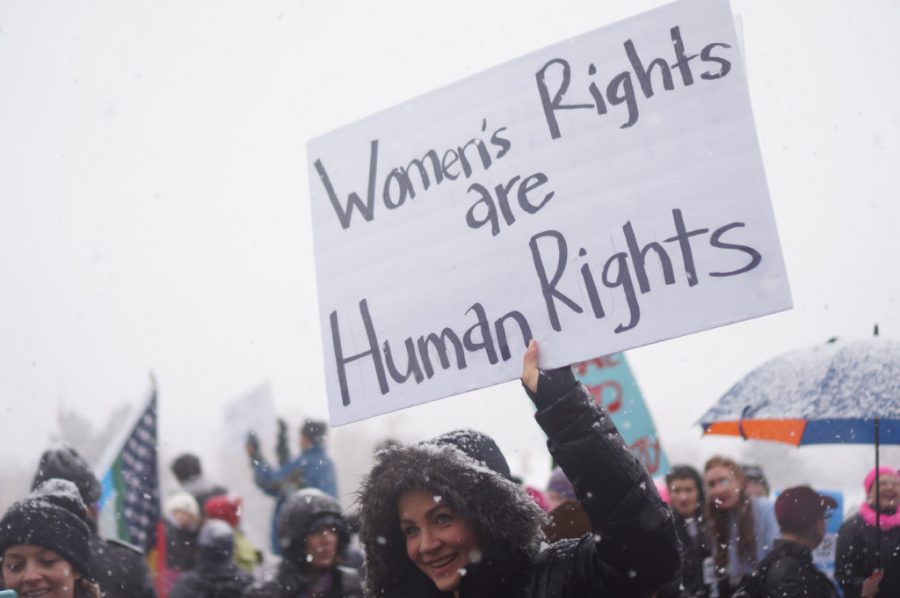Weglinski: Utah, Stop Making Decisions for Women
A woman holds a “Women’s Rights are Human Rights” sign during Women’s March on the Utah State Capitol in Salt Lake City, Utah on Monday Jan. 23, 2017. (Photo by Rishi Deka | Daily Utah Chronicle)
March 13, 2021
State lawmakers have made a habit of making Utah women’s lives significantly more difficult. As the Salt Lake Tribune Editorial Board wrote last month, “No Utah woman is safe when the Legislature is in session.” This year’s session was no different — another abortion amendment was in the works, exposing once again how poorly Utah treats its women. Sponsored by Rep. Steve Christiansen and Sen. Michael Kennedy, H.B. 253 would have mandated that women complete an online course module depicting the explicit details of an abortion procedure — an experience that is meant to shame and discourage women — before receiving an abortion. On top of that, women terminating their pregnancies would have to swear under penalty of perjury and provide proof that they have watched the video course in full. Thankfully, the bill failed, but it shed light on the many obstacles that abortion-seeking women face in Utah.
The state already requires women to complete a module before the procedure, but many pro-lifers believe that women skim over the material. H.B. 253 also emerged during a time of instability. “Over the past year, we have endured a pandemic, financial insecurity and a loss of faith in government due to political extremism… Now is not the time to be bringing forward another culture war bill. Lawmakers would do well to address the issues facing Utahns on a day-to-day basis, instead of running legislation meant to divide us,” said Lauren Simpson, Policy Director of Alliance for a Better Utah, to Deseret News.
Utah lawmakers — and the men in power in this state — need to stop meddling in women’s business. Instead of jumping to punitive laws that pose unnecessary obstacles for women, lawmakers should craft legislation that focuses on preventative measures, such as comprehensive sex education and easy access to birth control. H.B. 253 was not only insensitive but ultimately implied that women cannot be trusted to make our own decisions.
It’s extremely misogynistic to assume that women don’t understand what they’re doing when they seek abortion care. Katrina Barker, Director of Communication and Marketing at Planned Parenthood Association of Utah, said in an interview that the online course module “says multiple times that the state prefers a person not to get an abortion” and described it as “heavy-handed.” Women shouldn’t have to deal with being babied with information to shame them for something that is their own right of choice.
Abortion-seeking women already face many other hurdles. Barker noted the prevalence of procedure delays, for example, as well as travel and expense issues. If this bill had passed, it would’ve made traveling even more difficult for women by requiring in-person counseling sessions — even amid the pandemic — instead of the usual telehealth visits. H.B. 253 would’ve been another way for lawmakers to discourage abortions and impose their own moral beliefs onto women. In fact, 80% of Utahns oppose new restrictions on abortions. What Utah lawmakers should’ve focused on this session is Utah’s severely lacking sex education curriculum. One study shows that abortion rates drop significantly when young people have access to comprehensive sex education and free birth control. It’s time for Utah to wise up.
The women of Utah are tired — and for good reason. When we talk about how to reduce abortions, we need to shift the conversation away from putting blame on women and toward creating greater male accountability and preventative efforts. If lawmakers want to reduce abortions, Utah should focus on facilitating comprehensive sex education and offering free contraception to everyone, rather than shaming women for exercising their rights.












